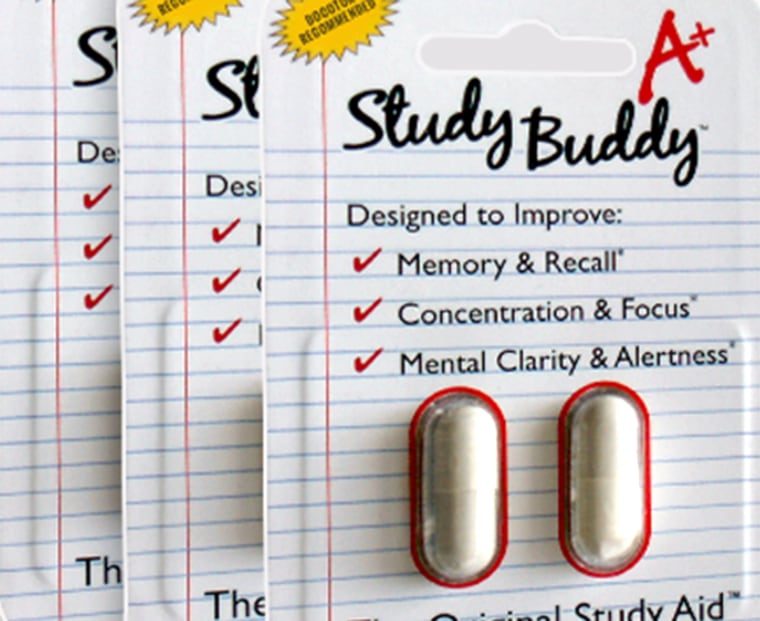College students pulling all-night study sessions chug energy drinks, coffee and have increasingly turned to prescription drugs like Adderall, raising fears about drug abuse. Now an over-the-counter dietary supplement is making brain-enhancing promises, but there’s no proof the "Study Buddy" pills — or any other supplement — will do anything for a student's GPA.
"Study Buddy" pills have spread all over Arizona, Nevada and Canada and have been growing in popularity on college campuses since launched by Brainiac Supplements in 2010. The packets, which contain two pills, promise to “enhance memory, mental clarity, and focus,” and to “optimize brain function.” Students, the company claimed, “can learn faster and more effectively.” They are not endorsed by any university, but are sold in convenience stores on and near campuses and online.
Like other such products, Study Buddy contains a combination of herbs and vitamins along with stimulants like caffeine.
“There’s no science out there that any supplement does any better than an espresso,” said Tammy Scott, a scientist at the Jean Mayer USDA Human Nutrition Center at Tufts University who has studied the effects of vitamins on cognition.
Brainiac founder and president Tyler Johansen, 30, said he started the company as way to give students a "natural way to improve academic performance." While attending the University of Arizona, he noted students drinking “energy drinks, and abusing prescription medicines,” as study aids.
The current Study Buddy formulation features massive doses of vitamin D and B vitamins (8,333 percent of the daily value of B12, for example), in addition to caffeine and a variety of herbs, like gingko leaf powder, that have long been reputed — though not proven — to improve memory.
The Study Buddy website says the pills contain “caffeine comparable to 8 ounces of coffee,” or approximately 95 milligrams of caffeine. The company warns that Study Buddy shouldn’t be used if “pregnant, nursing, under 18 years of age or have high or low blood pressure.”
The pills have never been studied in people, according to the company’s medical director. And they've not been checked out by the Food and Drug Administration because they're classified as a dietary supplement and don't require government approval for safety and effectiveness.
While there is data showing that vitamin B supplementation can help people suffering from some forms of cognitive decline, there are important caveats, said William “Scott” Killgore, the co-director of the social cognitive and affective Neuroscience Laboratory at Harvard Medical School’s McClean Hospital.
Trials have been conducted in people who are deficient in forms of vitamin B, but almost no Americans are deficient, said Tufts' Scott.
"And there is no evidence that taking more than what is considered deficient is better," Scott said.
Students cramming for exams will be sorry to hear that sleep is actually the best brain booster. But if somebody really needs to stay up all night and be alert, Killgore said, they could use lower doses of caffeine, about 200 milligrams, or two standard cups of coffee every two hours.
The two Study Buddy capsules, which equals one dose, cost $2.99 — about a dollar more than a Starbucks Grande black coffee.
Brian Alexander is a frequent contributor to NBC News and a co-author of “The Chemistry Between Us: Love, Sex, and the Science of Attraction.”
